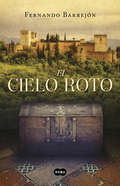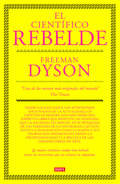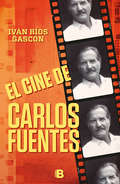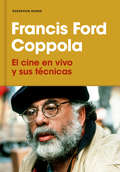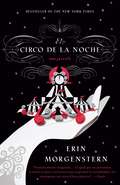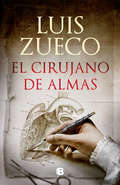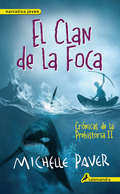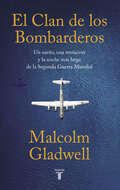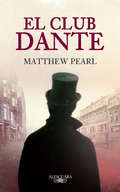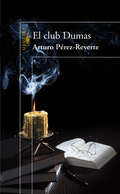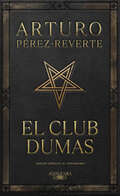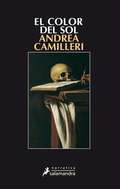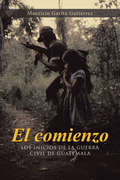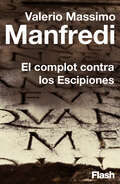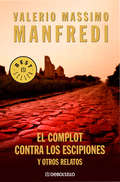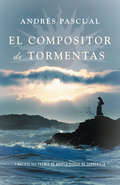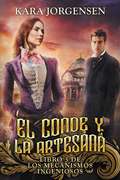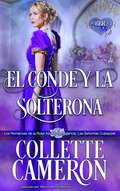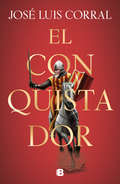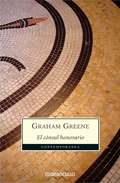- Table View
- List View
El cielo roto
by Fernando BarrejónUna novela histórica sobre una época que resultó crucial para nuestra historia. Yahia sabe que, pese a ser el médico más respetado e influyente en la Granada de 1492, debe tener cuidado con lo que hace ahora que los Reyes Católicos son sus nuevos soberanos. Sobre el papel, las Capitulaciones de Santa Fe garantizan que los naturales de Granada podrán seguir con su fe y sus costumbres, pero la realidad en las calles granadinas no es tan sencilla. Muchos, como el propio Yahia, se han convertido al cristianismo por precaución -aunque siguen practicando el islam en la intimidad familiar-; pero otros se resisten y luchan por mantener sus tradiciones. La convivencia pacífica y respetuosa entre musulmanes y cristianos impulsada por el arzobispo fray Hernando de Talavera se ve frustrada por la llegada a la ciudad del cardenal Cisneros, cuyos métodos provocan que la sangre llegue a correr por las calles de Granada. A lo largo de más deun siglo, esta novela cuajada de personajes reales narra las venturas y desventuras de los moriscos, desde su origen hasta su final. El prodigioso hallazgo de los libros de plomo del Sacromonte involucrará a Yahia y a sus descendientes en una aventura generacional, que llevará a Alonso de Luna, tataranieto de Yahia, desde Granada a Estambul, pasando por diferentes países europeos, con el fin de interpretar y preservar esa herencia sagrada que suponía un mejor entendimiento entre musulmanes y cristianos. Fernando Barrejón, a través de un exquisito uso del lenguaje y de una recreación fiel y seductora del contexto histórico, nos traslada y nos hace partícipes de un apasionante y decisivo capítulo de nuestra Historia. Visual, sembrada de detalles y descripciones, el autor nos ayuda a imaginar una época en la que la convivencia y la paz eran conceptos frágiles. Reseña:«Una novela histórica que retrata con acierto un período que abarca algo más de un siglo y que resultó crucial para nuestra historia. (...) Fernando Barrejón ha retratado una triste realidad, señalada por uno de los personajes: "los seres humanos no saben vivir en paz por mucho tiempo, enseguida encuentra una ambición para declarar guerras"».Blog Me gustan los libros
El científico rebelde
by Freeman DysonEstos ensayos, surgidos de la pluma de un extraordinario científico y magnífico escritor, iluminan tanto la historia de la ciencia como los polémicos debates actuales sobre ciencia, ética y religión. Desde Galileo hasta los astrónomos aficionados de la actualidad, los científicos siempre han sido rebeldes, espíritus libres que resisten las ataduras que la sociedad les impone. En su búsqueda de las verdades de la naturaleza les guía tanto la imaginación como la razón, y sus teorías más importantes tienen la excepcionalidad y la belleza de las grandes obras de arte. Freeman Dyson, uno de los científicos más respetados del mundo, opina que la mejor manera de entender la ciencia es entender a quienes la practican. Nos cuenta las historias de científicos trabajando: desde la entrega de Newton a la física, la alquimia, la teología y la política, hasta el descubrimiento de la estructura del átomo que hizo Rutherford o la tenaz resistencia de Einstein a la idea de los agujeros negros. Reseñas:«Una de las mentes más originales del mundo.»The Times «Dyson se ha convertido en uno de los más elocuentes intérpretes de la ciencia.»George Johnson, The New York Times «Lo que este libro contiene realmente es sabiduría, una sabiduría que nos ayuda a comprender cómo piensan y trabajan los científicos, y cómo la ciencia, bien entendida, nos ayuda a comprender mejor nuestro mundo.»Gregory M. Lamb, The Christian Science Monitor «Un caso evidente de omisión en los premios Nobel. Esta adictiva antología muestra a las claras su inteligencia.»Pathik Guha, The Telegraph «Dyson personifica el ideal del científico como iconoclasta. En esta fantástica antología reflexiona sobre la ética de la nanotecnología y la ingeniería genética, el crucial papel de los amateurs en ciencia y la riqueza de la "imaginación de la naturaleza.» «Provocador, emocionante y siempre sorprendente.»Wired «En esta ecléctica y maravillosa antología, Dyson exhibe la precisión de sus ideas en una prosa clara como el cristal, y los lectores acabarán entusiasmados ante la amplitud de sus conocimientos, la increíble habilidad para enlazar temas distintos y sus múltiples afirmaciones provocadoras.»Publishers Weekly
El cine de Carlos Fuentes
by Iván Ríos Gascón«Es muy probable que al escribir, jamás dejó de pensar en la pantalla como una de las formas más acabadas del arte y como un lujo de la inspiración» Para Carlos Fuentes, el cine fue una de sus pasiones más intensas. Una disciplina que abordó como crítico, teórico y en la que, incluso, incursionó como guionista, al tiempo que consolidaba su carrera literaria. Entre la crónica y el ensayo, este libro explora la relación del cine con su narrativa con el fin de desentrañar las inquietudes y certezas de la voluntad creadora. El cine de Carlos Fuentes nos lleva a recorrer los caminos literarios y las claves estéticas que el autor de Aura plasmó en sus cuentos y novelas, incluyendo la mirada de los cineastas que trasladaron sus obras al celuloide.
El cine en vivo y sus técnicas
by Francis Ford CoppolaEl posible futuro del cine según Francis Ford Coppola, uno de los cineastas más grandes del siglo XX. Un ensayo trufado de experiencias personales que seducirá a los cinéfilos. <p><p>En este libro, uno de los más aclamados cineastas modernos da un repaso exhaustivo a un nuevo medio audiovisual. <p>El Live Cinema es una forma de arte en vivo y en formato digital que puede aportar calidad a la creación e innovar en su difusión por salas de cine de cualquier rincón del mundo. <p>Su visión de este nuevo medio está trufada de observaciones e intuiciones magistrales, dada su larguísima experiencia en el séptimo arte: notas sobre las primeras décadas del cine, recuerdos sobre su fascinación con la televisión en directo de la década de los cincuenta, reflexiones sobre la dirección de actores, comentarios sobre la tecnología audiovisual más puntera... <p>Por ello, este volumen funciona también como una suerte de autobiografía, ya que Coppola repasa sus triunfos y fracasos con una honestidad inusitada.
El circo de la noche
by Erin MorgensternEl circo llega sin aviso, sin anuncio. Simplemente aparece. Dentro de sus carpas blancas y negras se vive una experiencia única, un banquete para los sentidos en el que se puede explorar un laberinto de nubes, caminar en un jardín de hielo o perderse en los ricos aromas de canela y caramelo que flotan en el aire. Bienvenidos al Circo de los sueños. Pero detrás de estas maravillosas escenas existe una feroz competencia un duelo entre dos magos jóvenes, Celia y Marcos, que han sido entrenados desde la infancia para competir en un juego. Obligados a participar por sus caprichosos amos, sin que ellos lo sepan, éste es un juego en el que sólo uno puede sobrevivir y el circo no es más que el escenario para una extraordinaria batalla de imaginación y voluntad. A pesar de todo, Celia y Marco caen irremediablemente enamorados un amor profundo y mágico que causa que las luces parpadeen y el ambiente se caliente con solo tocarse las manos. Pero sus amos siguen moviendo los hilos y el amor imprevisto de Celia y Marco les obliga a intervenir, dejando la vida de todos, desde los artistas a los espectadores, en gran peligro. Divertida, original y fascinante, El circo de la noche es una rica historia de amor que capta la imaginación y encanta los sentidos.
El cirujano de almas
by Luis Zueco¿PUDO UN MÉDICO CAMBIAR EL CURSO DE LA HISTORIA? Más de 150.000 ejemplares vendidos «Luis Zueco es el Ken Follett español.» Cadena Ser UN JOVEN CIRUJANO SEDIENTO DE CONOCIMIENTO Barcelona, 1797. Bruno Urdaneta solo tiene doce años cuando llega a la ciudad para trabajar como aprendiz de su tío Alonso, un cirujano veterano y malhumorado que pronto se dará cuenta de que su discípulo posee un don muy especial. UNA ÉPOCA DE PROFUNDOS CAMBIOS En un momento convulso en el que los ideales ilustrados se propagan por toda Europa y la sombra de Napoleón se cierne sobre España, el joven protagonista encarnará el nacimiento de la figura del médico moderno, aquel que salva vidas porque estudia el cuerpo del paciente, lo cuida con las manos y entiende su alma. UN HOMENAJE A QUIENES SE DEDICAN A SALVAR LA VIDA DE LOS DEMÁS La huella de un viejo secreto familiar llevará a Bruno de Barcelona a Madrid -donde estudiará en el recién creado Colegio de Cirugía- y finalmente a Cádiz, cuyas calles, durante la guerra de la Independencia, se han transformado en un inmenso campo de batalla. La muerte acecha a un pueblo que se ha convertido en el ejército de todo un país. ¿Puede un médico cambiar el curso de la Historia? Luis Zueco se consagra como un maestro de la novela histórica con esta narración llena de intriga y aventuras que, a través de la epopeya de Bruno Urdaneta, un personaje inolvidable que permanecerá para siempre en el corazón de los lectores, rinde homenaje a la profesión médica.
El clan de la foca: Crónicas de la prehistoria II (Crónicas de la Prehistoria #Volumen 2)
by Michelle PaverSegunda entrega de la apasionante serie de aventuras prehistóricas «Crónicas de la Prehistoria». Acompaña a Torak en su viaje hacia la isla del Clan de la foca. Meses después de derrotar al oso sanguinario que mató a su padre, Torak cree haber encontrado por fin en el Clan del Cuervo un entorno seguro y a salvo de los Devoradores de Almas. Sin embargo, su tranquilidad dura muy poco: una misteriosa enfermedad empieza a propagarse por el Bosque y el pánico cunde entre los clanes. Desesperado, Torak opta por emprender un peligroso viaje hacia una lejana isla, donde al parecer se conoce un remedio secreto contra la terrible epidemia. Tras superar azarosas peripecias a riesgo de su propia vida, en la isla del Clan de la Foca lo esperan el enigmático hechicero Tenris, el anhelado reencuentro con Lobo y su amiga Renn y, más importante aún, un sorprendente descubrimiento sobre sí mismo.
El clan de los bombarderos: Un sueño, una tentación y la noche más larga de la Segunda Guerra Mundial
by Malcolm GladwellLa Segunda Guerra Mundial contada desde el aire. ¿Qué ocurre cuando la tecnología y las mejores intenciones chocan en el fragor de las batallas? «Excepcional, una obra maestra».The Wall Street Journal Durante los años previos a la Segunda Guerra Mundial, en una base aérea de Alabama, un grupo de pilotos renegados forjó una idea radical. ¿Qué pasaría si los bombardeos fueran tan precisos como para que las guerras pudieran librarse solamente desde el aire? ¿Podrían los brutales enfrentamientos entre ejércitos de tierra convertirse en cosa del pasado? Este libro cuenta lo que ocurrió cuando intentó llevarse a la práctica ese sueño. Malcolm Gladwell sigue los pasos de un genio holandés y su ordenador analógico casero, del grupo de científicos pirómanos de Harvard que inventaron el napalm, de un brillante piloto que cantaba tonadas a su equipo y del comandante LeMay, quien ordenaría uno de los ataques más sangrientos de la Segunda Guerra Mundial. A su más puro estilo, Gladwell les saca jugo a todos estos personajes fascinantes y nos lleva ágilmente a través de una serie de dilemas que cambiaron el rumbo de la historia para para preguntarnos cuál puede llegar a ser, a menudo, el precio del progreso. La crítica ha dicho:«Excepcional, una obra maestra. Uno acaba este libro sacudiendo la cabeza ante la locura y el coste humano que acarreó todo lo que narra».The Wall Street Journal «Cautivador. En las hábiles manos de Gladwell, los generales de la Fuerza Aérea de la Segunda Guerra Mundial vuelven a la vida. Me hubiera encantado que fuera el doble de largo».New York Times Book Review «Una fábula brillantemente contada e ideal para la era de los cambios tecnológicos».The Sunday Times «Otro libro de Gladwell que confirma que todo lo que creía saber era falso».Kirkus «Gladwell es posiblemente el narrador más solvente de la no ficción. Siempre sabe hacia dónde va y te lleva con él en un viaje que siempre resulta placentero y cómodo».The New Statesman «Fascinante. Uno de los mayores desafíos morales de la Segunda Guerra Mundial»Michael Lewis «La narración enérgica y los personajes reales e increíblemente carismáticos son propios del cine».Radio Times «Un relato accesible y estimulante. El estilo ameno y desenfadado de Gladwell es eficaz, y sus retratos de individuos son cautivadores».The Washington Post «De una empatía sorprendente y una energía fabulosa».Esquire «Vívido y cautivador. Una historia fascinante».The Times «Un relato repleto de anécdotas sobre lo que condujo al ataque aéreo más mortífero de la Segunda Guerra Mundial. Gladwell ofrece detalles coloridos y plantea interesantes cuestiones sobre la moralidad de la guerra».Publishers Weekly «Apasionante. Una escritura absorbente».The Telegraph
El club Dante
by Matthew PearlCon más de 2.000.000 de ejemplares vendidos y traducido en 40 países, El club Dante se ha convertido ya un clásico refrendado por el éxito entre el público y la crítica. En el convulso y puritano Boston de 1865 los miembros del club Dante -poetas y profesores de Harvard dirigidos por Henry Wadsworth- da los toques finales a la primera traducción norteamericana de La Divina Comedia a pesar de la oposición de la vieja guardia de la Universidad, que quiere mantener al Nuevo Mundo alejado de lo que considera supersticiones extranjeras. Al mismo tiempo se suceden una serie de brutales asesinatos basados en los tormentos descritos en el Infierno de Dante. La investigación oficial recae sobre Nicholas Ray, el primer y único policía negro del departamento de Boston. Los miembros del club junto con el policía marginado intentarán descifrar la clave que les lleve a identificar al asesino... aunque tal vez esté más cerca de lo que jamás hubieran pensado. Reseña:«Aúna entretenimiento y erudición a través de una historia de misterio y suspense.»El Mundo
El club Dumas
by Arturo Pérez-ReverteLa gran novela de Arturo Pérez-Reverte que abrió el camino del éxito internacional a los thrillers inspirados en el mundo de los libros ¿Puede un libro ser investigado policialmente como si de un crimen se tratara, utilizando como pistas sus páginas, papel, grabados y marcas de impresión, en un apasionante recorrido de tres siglos? Lucas Corso, mercenario de la bibliofilia, cazador de libros por cuenta ajena, debe encontrar respuesta a esa pregunta cuando recibe un doble encargo de sus clientes: autentificar un manuscrito de Los tres mosqueteros y descifrar el enigma de un extraño libro, quemado en 1667 con el hombre que lo imprimió. La indagación arrastra a Corso -y con él, irremediablemente, al lector- a una peligrosa búsqueda que lo llevará de los archivos del Santo Oficio a los libros condenados, de las polvorientas librerías de viejo a las más selectas bibliotecas de loscoleccionistas internacionales. Construida con excepcional talento narrativo, El club Dumas sitúa pieza a pieza una trama excitante, minuciosa y compleja, donde se dan cita los ingredientes de la novela clásica por entregas, los relatos policíacos y de misterio, los juegos de adivinación y las técnicas del folletín de aventuras. Esta novela fue llevada al cine por el director Roman Polanski con el título La novena puerta. La crítica ha dicho...«Un auténtico thriller, una trama maravillosamente compleja.»The New York Times Book Review «Entre El nombre de la rosa, el juego de rol y Agatha Christie.»L'Express «Hay un escritor español que se parece al mejor Spielberg más Umberto Eco. Se llama Arturo Pérez-Reverte.»La Repubblica «Ni el lector más perspicaz podría anticiparse a las electrizantes sorpresas de este misterio elegante como un Escher.»The New Yorker «El español Pérez-Reverte camina gallardamente sobre las huellas del gran Alejandro Dumas haciendo malabarismos con los personajes, multiplicando pistas falsas e intrigantes misterios.»Bertand Audusse, Le Monde
El club Dumas
by Arturo Pérez-ReverteLa gran novela de Arturo Pérez-Reverte que abrió el camino del éxito internacional a los thrillers inspirados en el mundo de los libros ¿Puede un libro ser investigado policialmente como si de un crimen se tratara, utilizando como pistas sus páginas, papel, grabados y marcas de impresión, en un apasionante recorrido de tres siglos?Lucas Corso, mercenario de la bibliofilia, cazador de libros por cuenta ajena, debe encontrar respuesta a esa pregunta cuando recibe un doble encargo de sus clientes: autentificar un manuscrito de Los tres mosqueteros y descifrar el enigma de un extraño libro, quemado en 1667 con el hombre que lo imprimió. La indagación arrastra a Corso -y con él, irremediablemente, al lector- a una peligrosa búsqueda que lo llevará de los archivos del Santo Oficio a los libros condenados, de las polvorientas librerías de viejo a las más selectas bibliotecas de los coleccionistas internacionales. Construida con excepcional talento narrativo, El club Dumas sitúa pieza a pieza una trama excitante, minuciosa y compleja, donde se dan cita los ingredientes de la novela clásica por entregas, los relatos policíacos y de misterio, los juegos de adivinación y las técnicas del folletín de aventuras.Esta novela fue llevada al cine por el director Roman Polanski con el título La novena puerta. La crítica ha dicho...«Un auténtico thriller, una trama maravillosamente compleja.»The New York Times Book Review «Entre El nombre de la rosa, el juego de rol y Agatha Christie.»L'Express «Hayun escritor español que se parece al mejor Spielberg más Umberto Eco. Se llama Arturo Pérez-Reverte.»La Repubblica «Ni el lector más perspicaz podría anticiparse a las electrizantes sorpresas de este misterio elegante como un Escher.»The New Yorker «El español Pérez-Reverte camina gallardamente sobre las huellas del gran Alejandro Dumas haciendo malabarismos con los personajes, multiplicando pistas falsas e intrigantes misterios.»Bertand Audusse, Le Monde
El club del té
by Vanessa GreeneCon el aroma de una taza de té, la vida sabe mejor. Tres mujeres muy diferentes se conocen y se quedan prendadas del mismo juego de té vintage en un mercadillo de Sussex. Deciden compartirlo... y terminan trabando una amistad que cambiará sus vidas. Jenny se muere de ganas de casarse con Dan. Pero, tras años de silencio, recibe noticias de la mujer que puede dar al traste con sus sueños. Maggie ha superado una ruptura matrimonial y está preparando el mayor evento de su carrera... hasta que se ve obligada a enfrentarse al pasado de nuevo. Alison parece tenerlo todo: casada con el amor de su infancia y con dos hijas preciosas. Pero a medida que se acumulan las tensiones, su matrimonio se ve empujado al límite. El Club del Té es una reconfortante y magnífica novela sobre la amistad y la familia, las relaciones personales y la vida profesional. Un precioso relato que dejará poso en todos sus lectores. Reseñas:«Un delicioso brebaje de amor y amistad.»Trisha Ashley «Esta reconfortante historia sobre el encuentro de nuevas amistades en un debut precioso.»Carole Matthews «Un hermoso testamento de la amistad y una lectura muy placentera.»Candis «Una historia reconfortante e intrínsecamente británica.»Stylist En los blogs...«Es una novela deliciosa, encantadora y tierna. Al final, te deja sonriente y complacida, igual que si hubieras dado el último sorbo a un buen té. Me han dado ganas a mí de empezar a coleccionar tacitas vintage.»Blog Torre de Babel
El colegio: La formación de una elite meritocrática en el Nacional Buenos Aires
by Alicia MéndezUn ensayo a partir de entrevistas a ex alumnos de distintas promocionessobre el Colegio Nacional de Buenos Aires como el modelo meritocráticopor excelencia formador de elites de la Argentina desde hace 150 años. En un país como la Argentina, marcado por discontinuidades políticas einstitucionales, con cambios a menudo abruptos de orientacionesideológicas, el Colegio Nacional de Buenos Aires se mantuvo durante 150años como un modelo educativo destinado a formar a buena parte de laselites. ¿Cómo fue posible? ¿Cómo, pese a todas las mudanzas de un paíssiempre imprevisible, esta institución emblemática logró conservarciertas características que la identifican en el imaginario nacional?Una profunda y extensa investigación unida a una prosa ágil y amenapermiten a Alicia Méndez brindar una imagen renovada del Nacional BuenosAires que resulta, a la vez, un instrumento para pensar a la Argentinamoderna. Un colegio que formó a dos premios Nobel, a tres presidentes ya tantas figuras significativas de la vida pública, de la Generación del80 a Montoneros, y que muestra desde su fundación los rasgos de unainstitución sorprendentemente abierta en términos de origen social,residencial y de género de sus estudiantes.A través de entrevistas a ex alumnos y un amplio trabajo en el archivodel Colegio, combinados con textos autobiográficos y otras fuentesdocumentales, la autora reconstruye de modo fascinante tanto lastrayectorias individuales como las formas de sociabilidad en ese mundosingular -del Buenos Aires- un lugar concebido por muchos como una«isla de mérito en un país en el que corren otros aires».
El color del Imperio
by Ignasi SerrahimaTras El mapa del fin del mundo, Ignasi Serrahima nos lleva en una fascinante aventura a través de una época convulsa y un oficio desconocido para muchos, revelándonos que hay personas que no se rinden hasta hacer realidad sus sueños. «Mi nombre es Alamanda, soy cristiana, y tengo mucho todavía que vivir». Un viaje épico por el Mediterráneo medieval. El secreto de un color escondido en un libro durante siglos. Cataluña, siglo XV. Alamanda, vendida como esclava por su propio padre cuando todavía era solo una niña, descubre en la biblioteca del monasterio de Sant Benet, entre los anaqueles de los libros prohibidos, el secreto del color más maravilloso que jamás ha sido capaz de crear la humanidad: la púrpura. Símbolo de emperadores, papas y reyes, mil veces más cara que el oro, la púrpura fue forjador de imperios comerciales en la Antigüedad, pero la técnica de obtención de este pigmento se perdió inexplicablemente en la bruma de los tiempos. Solo una muchacha será capaz de devolver al mundo el color del Imperio. De la Barcelona amurallada y gremial a la pujante Venecia, de la Constantinopla ostentosa y decadente a las ruinas de Tiro, el viaje épico y el éxito de una mujer sola en un mundo de hombres asombra al mundo y la coloca en el centro de las intrigas de los poderosos.
El color del corazón: La historia de Harriet Beecher Stowe y la novela que cambió una nación: La cabaña del tío Tom
by Mario Escobar&“Convertir a la señora Harriet Beecher Stowe, escritora de La cabaña del tío Tom, en la heroína de su propia vida, ha sido la manera de regalar a este siglo XXI, un nuevo relato de la lucha entre el Amor, la Verdad y la Fe, frente al odio, el racismo y la mentira&”. &“Este libro es una obra de arte. Inteligente. Ingeniosa y encantadora. La vida de la señora Beecher Stowe es una increíble incursión en los confines de la fe, desde la duda y el descubrimiento, hasta la gran aventura de ser consecuénte con lo que uno cree hasta las últimas consecuencias&”. La esposa del pastor Calvin Stowe se encuentra destrozada tras la pérdida de su último hijo. Después de una depresión, decide regresar a la iglesia. Mientras el predicador está lanzando su mensaje tiene una visión que le animará a escribir una novela sobre la situación de los esclavos en los Estados Unidos.Harriet Beecher Stowe se lanzará a esta Aventura, tras conocer a un esclavo fugitivo que le contará la increíble historia de un hombre llamado Tom y su lucha de fe, esperanza y amor, en un mundo cruel, en el que todo tiene un precio.La historia de Eliza, una madre mulata luchando por su hijo, Evangeline, una niña que quiere redimir la conciencia de su padre o el propio Tom, convencido que el amor es el único que puede vencer al odio y la maldad. &“Cuándo el precio de la libertad es la vida, una nación entera tendrá que enfrentarse a sus propias contradicciones&”
El color del sol
by Andrea CamilleriUna nueva demostración del inagotable pozo creativo de Andrea Camilleri, quien, con su habitual mezcla de rigor y viveza, otorga voz propia al genial maestro del claroscuro. Hombre de costumbres disolutas al que sigue rodeandocierta aura de «artista maldito», el genial Caravaggio es objeto de este original ejercicio de estilo con que Andrea Camilleri sorprenderá una vez más a su numerosa legión de fieles lectores. En una pirueta narrativa con tintes de rocambolesca aventura personal, el propio Camilleri se convierte en personaje del relato al recibir, en el transcurso de un viaje a Siracusa, un mensaje de un desconocido que lo convoca a una cita secreta. Por deformación profesional, Camilleri es incapaz de resistirse a la tentación de un misterio que llama a su puerta y acepta dejarse llevar clandestinamente hasta un lugaren el campo donde descubrirá un precioso manuscrito de Caravaggio que ha permanecido oculto durante cuatrocientos años. Así, los supuestos diarios del gran maestro de la pintura italiana constituirán una suerte de relato criminal, plagado de sombras, extravíos y curiosidades, y una brillante exploración de los aspectos más profundos del mundo del barroco y de las contradicciones de un artistaúnico.Una nueva demostración del inagotable impulso creativo de Andrea Camilleri, quien, con su habitual mezcla de rigor y viveza, otorga voz propia al inmortal maestro del claroscuro.
El color púrpura
by Alice WalkerUn clásico del feminismo y la lucha contra el racismo del siglo XX. Esta es la historia de dos hermanas: Nettie, que ejerce como misionera en África, y Celie, que vive en el Sur de Estados Unidos, casada con un hombre al que odia y abrumada por la vergüenza de haber sido violada por quien cree que es su padre. A lo largo de treinta años ambas mantienen el recuerdo y la esperanza de reencontrarse y vuelcan sus sentimientos en unas cartas conmovedoras. Pero la dramática existencia de Celie cambiará cuando entre en su vida la amante de su marido, una extraordinaria mujer llama Shug Avery. Alice Walker traza en esta ya clásica historia, narrada en formato epistolar, un crudo y sin embargo bello relato del abuso hacia las mujeres y la comunidad afroamericana en los Estados Unidos de la primera mitad del siglo XX. El relato de ambas hermanas, merecedor del Premio Pulitzer y del National Book Award en 1983, se convierte en símbolo de una lucha que aún a día de hoy no hemos acabado de librar. La crítica ha dicho...«Una de las más talentosas escritoras estadounidenses.»Isabel Allende «Una novela siempre vigente.»Newsweek «Alice Walker es una escritora maravillosamente dotada.» The New York Times Book Review «El color púrpura sitúa a Walker a la altura de Faulkner.» The Nation «Genial. Un libro para enmarcar junto a los clásicos de la literatura de todos los tiempos.» San Francisco Chronicle
El comienzo: Los inicios de la guerra civel de Guatemala
by Mauricio Garita GutiérrezGuerra civil, conflicto, Jacobo Arbenz, Jorge Ubico, ideología, conflictividad. Guatemala ha sido, en la mayor parte de su existencia, un país de contrastes y convulsiones. Uno de los contrastes más importantes ha sido el de la guerra civil de Guatemala que duró 36 años pero sus réplicas se siguen sintiendo en la sociedad. <P><P>Es por ello que resulta imperativo el investigar la razón por la cual sucedió esta guerra a la luz de la nueva información que ha surgido y bajo un enfoque de conflictividad. El libro que tiene en sus manos comenta la importancia de entender el inicio de los conflictos, saber lo que sucedió en dicha época y analizar los diferentes caminos que pudieron llevar a la paz para que estos no vuelvan a repetirse en Guatemala.
El complot contra los Escipiones (Flash Relatos #Volumen)
by Valerio Massimo ManfrediLa pericia que demuestra Manfredi en cada una de sus novelas históricas se haya condensada en esta aventura histórica apasionante. Siglo II a. C. El tributo que Antíoco, rey de Siria, ha de pagar a Roma por la firma de la paz acaba de llegar a Brindisi. El tesoro ha tocado puerto tras evitar escalas que pudieran poner el valioso cargamento en peligro. Hasta Roma ya solo resta un camino relativamente cómodo por «La reina de los caminos», la Via Apia. A Elio Prisco, tribuno de la Séptima Legión, solo le quedan dos escollos por sortear: a los innumerables salteadores que jalonan el camino, y a los descontentos que intentan evitar un más que probable gobierno de los Escipiones. Este relato forma parte de la colección de relatos El complot contra los Escipiones y otros relatos.
El complot contra los escipiones y otros relatos
by Valerio Massimo ManfrediTres relatos cuyo hilo conductor son los caminos por los que discurren hombres y civilizaciones. El primer relato, «El complot contra los Escipiones», transcurre en la via Appia, la calzada romana que conducía de Roma a Brindisi, en tiempos de los Escipiones, el rey Antíoco de Siria y el preciado tributo que debía recorrer esta «Reina de los caminos» desde las tierras de Antíoco. El segundo, «El caballero invisible», transcurre en los últimos tiempos de el Al-Andalus, cuando la conquista cristiana estaba en su momento álgido y los caballeros de la Cristiandad se daban cita en sus tierras para combatir al infiel. Por fin, el escenario del tercero, «La carretera», no podía ser otro que la mítica Ruta 66 que, en vez de conducir a un grupo de amigos a vivir sus sueños de juventud, les arrastra en un viaje de pesadilla.
El compositor de tormentas
by Andrés PascualLas soberbias ambiciones de Luis XIV y de Isaac Newton embarcan al joven violinista Matthieu en un peligroso viaje para hacerse con la melodía del alma: la música más antigua de todos los tiempos, depositaria de poderes muy codiciados. Matthieu es un joven genio de la música que, fascinado por la magia de Versalles y sus fiestas desenfrenadas, anhela formar parte de la orquesta de Luis XIV, el Rey Sol. Lo que no imagina es que un brutal asesinato le abrirá las puertas de palacio para llevar a cabo el proyecto más ambicioso del soberano: transcribir la melodía del alma. Pronto descubrirá que no es el único que codicia esa partitura, entre cuyas notas se oculta la fórmula alquímica que permitirá a su dueño conocer los secretos del universo. Para ganar esa carrera, Matthieu se embarcará en una peligrosa expedición a Madagascar, el último edén inexplorado, una isla de leyenda elegida por su pureza para resguardar la música más antigua de todos los tiempos. A partir de entonces se enfrentará con la muerte a cada paso, pero al mismo tiempo se abrirá ante él un mundo lleno de romanticismo que le hechizará casi tanto como una bella y misteriosa mujer que parecía estar esperando su llegada. El compositor de tormentas fue novela finalista del VIII Premio de Novela Ciudad de Torrevieja. La crítica ha dicho...«Reúne cuatro aspectos fundamentales: la aventura, el romanticismo desgarrado que conserva el tono de los clásicos, la música como parte de la trama y como esencia del argumento y la espiritualidad con la que ya sorprendió en su ópera prima.»Diario de Burgos
El conde y la artesana
by Kara Jorgensen Camila Jara¿Qué misterios se hallan enterrados bajo las malezas y el polvo? Tras su boda, Eilian y Hadley Sorrell viajan a Brasshurst Hall, la casa ancestral de su familia que estaba abandonada. Mientras Eilian lucha por conciliar sus nuevas labores como marido y conde, descubre que la casa y el pueblo circundante no son como le parecieron al principio. Tras una máscara de buenos modales y de educación amable, yace un lado más oscuro de Folkesbury. Conforme los Sorrell se esfuerzan por encajar en la sociedad más refinada del pueblo, descubren que sus nuevos amigos están a merced de Randall Nash, un hombre que reúne secretos. Pronto, Eilian y Hadley se ven envueltos en una red de asesinatos, robos e intrigas de la que jamás podrían escapar, pues la mansión está en medio de todo ello. Han encontrado algo que se creía perdido hace mucho y que había estado enterrado dentro de la historia de Brasshurst... algo por lo que vale la pena matar.
El conde y la solterona. (Los romances de la rosa azul de la regencia: Las señoritas Culpepper, Libra uno #1)
by Collette CameronUn conde colérico. Una solterona desesperada. Una apuesta imprudente. Por cinco años, Brooke Culpepper ha focalizado su energía en dos cosas: mantener la batalla para que la granja lechera, que es su hogar, siga operando y prevenir que su hermana más joven y primas mueran de hambre. Entonces, un día un extraño de cara severa llega a la entrada de su casa y anuncia que es el nuevo propietario y planea venderla. Aunque ella está indignada, Brooke no puede negar que el Conde de Ravensdale hace que su pulso corra de las formas más perturbadoras. Heath se indigna al descubrir que cinco mujeres llaman a las tierras que él ganó en una mesa de juegos, su hogar. Detesta todo acerca del campo y no tiene deseos de poseer una granja olorosa, aunque una de las ocupantes sea la mujer más inteligente y fascinante que jamás haya conocido. Desesperada, indigente, y sin un lugar donde llevar a su familia, Brooke sin reflexionar propone una apuesta. ¿Los riesgos de Heath? La granja. ¿Los de ella? Su virtud. Las tierras no son de interés para Heath, pero él encuentra a Brooke irresistible, e ignorando la prudencia como así también su sentido del honor, solo alocadamente acepta su desafío. En una apuesta en la que el ganador se lleva todo, ¿se arrepentirán de sus impulsos, especialmente cuando el amor está en juego?
El conquistador
by José Luis Corral«Los nacionalismos manipulan la Historia para justificar su visión del pasado. Jamás existió una Corona catalano-aragonesa, y así lo demuestro en esta novela sobre Jaime I el Conquistador.»José Luis Corral Ningún soberano gobernó en España tanto tiempo como él, ninguno ganó tantas batallas, ninguno conquistó tantos reinos como Jaime I el Conquistador, rey de Aragón, de Valencia y de Mallorca, conde de Barcelona y de Urgel, señor de Montpellier. Esta es su prodigiosa historia, su asombrosa vida de novela, su apasionante leyenda en el tiempo más brillante de la Edad Media. Con la maestría narrativa que lo caracteriza, el catedrático de Historia Medieval y novelista José Luis Corral despliega ante los ojos del lector una fascinante historia de conquistas, rivalidades y pasiones que resulta imprescindible para comprender la configuración de la España contemporánea y rebatir, con el rigor del relato histórico impecableme nte documentado, el mito independentista de la mal llamada «Corona catalano-aragonesa».
El consul honorario
by Graham GreenePor un lamentable error, la guerrilla argentina secuestra a un griscónsul honorario, sin ningún interés para el gobierno británico. Lapretensión de negociar queda rápidamente frustrada, y el cónsul, CharlesFortnum, queda en manos de un grupo encabezado por un ex sacerdote conel que le unieron vínculos de amistad. Situada en la provincia de Corrientes en los años setenta, el autor seinspiró en el secuestro auténtico del cónsul paraguayo Waldemar Sánchezocurrido en marzo de 1970 mientras Greene estaba de visita en laArgentina.
